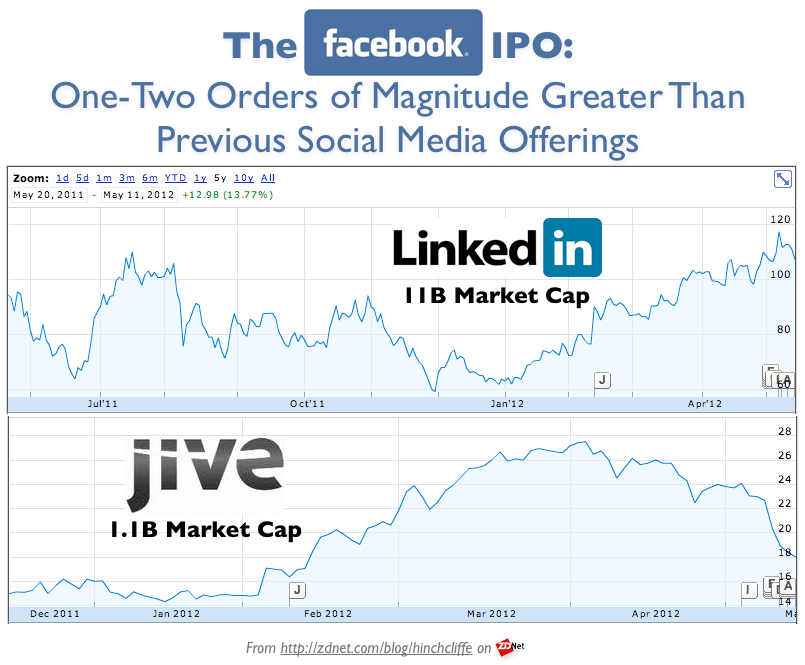Facebook's IPO: The social business implications

It's at the intersection of companies that wish to engage with Facebook's audience, and the Facebook platform itself, where the vast majority of the business opportunity lies. It's likely -- though not yet a certainty -- that the world's largest and most well-known social network will finally go public in the coming week. With over 900 million users, Facebook is by any measure a tremendous online success story. A recent summary of the IPO data points from Reuters says it all: The social media juggernaut has some of the highest levels of user engagement in Internet history (483 million daily active users), a decent revenue stream of $3.7 billion in 2011 (85% of which is advertising dependent), and its net revenue skyrocketed 65% last year.
The move to open ownership of the company to the world at large is almost certainly going to be a watershed moment in the nascent social media industry. This is an industry that long last is finally coming into its own after years of rapid growth and finding its way in terms of business models, user adoption strategies, and competitive positioning. It's no accident that Zynga represents about 12% of Facebook's revenue: Social games have become a substantial trend and it was smart for Facebook to ensure it had a stake in this hot new area of social media.
Related: Enterprise gamification: Will it drive better business performance?
There's little question that the timing itself is good: With the stock market coming back, the acceptable performance of other social media IPOs (LinkedIn and Jive Software have done well, or at least not lost value since their debut), the undoubtedly intense pressure by investors and vested workers to get their payday, and the need to capitalize growth and new products to maximize their potential and fend off competitors, all points to one thing: Going public is really the logical next step.
But going public brings with it all new pressures. For venture backed companies such as Facebook, it means a difficult transition from the multi-year expectation on delivering returns, to the quarterly results horizon. Even in the extremely fast moving world of Internet companies, this can come as a shock to the system. Facebook's business simply must perform and perform well every quarter for the foreseeable future, especially with a high opening stock price. And this is where its business model will face a major test to live up to what most financial experts are saying is a lofty estimate of its valuation, nearly $100 billion on the high end by many sources.
The business models of social media
But ultimately, as has been pointed out, if a service is entirely free to an audience, then that audience is the product. Not only is Facebook free to its users, there isn't even a "pro" version, like LinkedIn offers. When the size and health of an ecosystem (i.e. network effect) is so central to digital success of any kind these days, any barrier to growth and reach is considered anathema. In other words, Facebook feels it must go elsewhere, and not its users, to make money. This in turn, will have significant implications to the second industry growing up next to social media: That of the world of social business, which aims to situate social media -- adapted specifically to enterprise needs -- to improve the way businesses operate inside and outside their walls.
As Derek Harris wrote on Gigaom this morning, Facebook must make the most of the data it has about its users while walking an incredibly fine line in terms of privacy and trust. The more Facebook exploits its invaluable datasets on user behavior, wants, and desires, the less users will be inclined to divulge such information, eroding the inherent value of its social network. The fear is, because its intrinsic value is really under the control of its audience (namely us), it's only a few serious missteps away from a participative collapse or end-user backlash, which would spell significant trouble for the company valuation. Today's business world is rife with examples of social media fueled tempests that have had long term impact to their brands. Facebook's very business model is based on an approach that has high probably in creating such a backlash in my opinion, creating significant long-term challenges to real growth.
But there's also little doubt that Facebook's management team is acutely aware of all of this and has prepared the company for all of these issues and the transition to becoming a public company. Or at least, for their investors' sake, I hope that's the case. Instead, what's more interesting are the implications for organization that are trying to use the social networking giant to better engage with their customers, workers, and suppliers. Facebook pages and Facebook apps are now extremely popular and cost-effective of ways of going to where people are today and engaging with them for marketing, sales, informational, user support, and other community-powered functions. In fact, it's at the intersection of companies that wish to engage with Facebook's audience, and the Facebook platform itself, where the vast majority of the business opportunity lies. With all but 15% of its revenue coming from advertising and with all eyes on its revenue growth, Facebook must continue to rapidly innovate in helping businesses better engage with their various constituents inside of the company's industry-leading social network.
Related: Facebook IPO demand is strong and weak
The social business implications of Facebook's IPO
This pressure to perform, combined with untold as-yet-untapped opportunities to make the most out of nearly a billion socially connected users -- is where the most interesting social business implications of Facebook's transition to a public company exist.
- Facebook as the face of CRM. If customer engagement of all kinds is going social, Facebook must become the leader in this, or more enterprise-savvy providers will do this for them. See my recent discussion on this for details. While some could argue that Facebook is already the social CRM leader for SMB customers via Facebook pages, the real revenue growth opportunity short-term is for mid-market to large enterprises.
- Mobile-first and mobile-native service delivery. While Mark Zuckerberg has already telegraphed that 2012 will be about moving Facebook's business models to mobile devices, which it has only done in a limited fashion so far, a simple transplant of its features isn't sufficient. Instead, the now-iconic social network must re-invent its experience for today's smart mobile devices. The near future must consist of useful capabilities centered around location-awareness, NFC, voice recognition, augmented reality, and fundamentally better exploitation of sensors, video, and audio on mobile than they have been able to achieve including multi-point video chat. Most critically of all perhaps, and certainly the most challenging, will be the need for it move 3rd party apps onto mobile, something that's technically quite challenging given the distribution control and inherent nature of mobile operating systems. Mobile devices are unlike the Web; they're not small pieces loosely joined. This then is one of Facebook's biggest generational obstacles: Fully exploiting native mobility in a way that won't greatly impact its business.
- Open data, APIs, and arbitrage. Facebook has kept a tight lid on its APIs and for good reason. But ask Amazon, eBay, and other Internet giants where their business models are heading and it's about opening up as much as possible for 3rd parties to use their own investments to build on top their platforms. Businesses of all kinds are now eager to pay to connect their own supply chains to Facebook, if only the Internet giant can figure out how to do it safely and effectively.
- Enabling the social business intelligence cycle. There is also a potentially large growth opportunity in unleashing the big data story around Facebook's user data, again, if it can be done safely. Virtually all companies today must develop and operate their listening, analyzing, and engagement cycle with the world of social media. Facebook could be a leader in enabling it, rather than letting 3rd parties such as Radian6 do it for them.
- Moving inside of companies. Another potential move for Facebook is becoming an effective enterprise social network. Certainly LinkedIn has announced its intention for doing so, but it's less clear how Facebook would do this successfully. However the company already has the user base to make this move and tap into the enterprise revenue it represents, creating a consistent platform for users to engage in all of their social activity. While I don't think Facebook has much interest or the right expertise to do this, that doesn't mean it can't address the issues and creating a unified experience for all social activity, personal and professional. For the latter, it could potentially charge a great deal. This would have major implications for other enterprise social networking vendors.
However, these are just a few of the possible implications for Facebook launch into the serious world of finance. I suspect there are a great deal more. Please share what you believe they are in Talkback below to continue the industry discussion.
